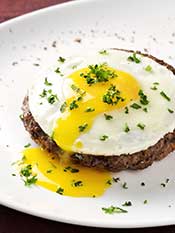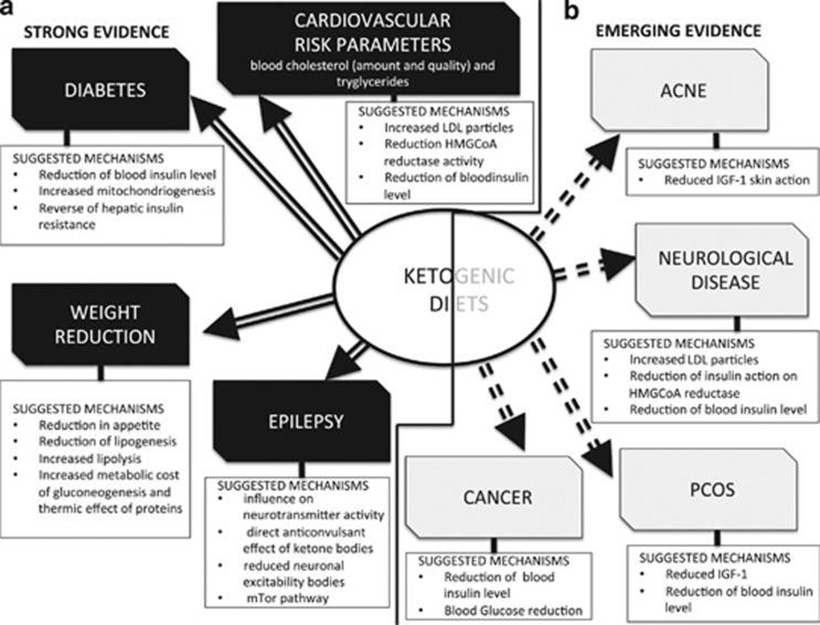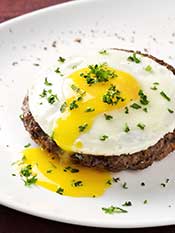
With all the hype about zero carb and carnivorous diets in recent times, this article takes a look at a diet from the 1950’s.
Dubbed the ‘steak and eggs diet,’ this particular eating plan was the creation of a bodybuilder named Vince Gironda.
Many people assert that this diet leads to easy weight loss and that it is effortless to follow.
But is this true?
And more to the point, is a diet full of red meat and eggs healthy? Or is it better to avoid?
This article will explain what the diet is, how it works, the benefits, and the concerns.
The steak and eggs diet was created by a bodybuilder named Vince Gironda in the 1950’s.
It is a virtually zero carb, carnivorous diet that features only two foods; steak and eggs.
The diet is a kind of old-school bodybuilding plan which is very high in protein, moderate to high fat, and low in carbohydrate,
However, unlike pure zero carb diets, this one emphasizes a "cheat day" every sixth day to re-feed on carbohydrates.
As a result, the diet is basically 5 days on and then 1 day off.
Some people refer to the steak and eggs diet as a kind of ketogenic—or cyclical ketogenic—diet (CKD).
However, this is not entirely accurate since keto diets are intended to be high in fat and to contain moderate amounts of protein.
The steak and eggs diet encourages a "cheat day" every sixth day.
This "cheat" is probably intended as a way to refill muscle glycogen stores. This is probably in the belief that doing so helps to boost performance levels.
While this carb re-feed could technically include any food, focusing on healthier carbs like fruit, sweet potatoes and yams is optimal.
Of course, this so-called cheat day isn’t necessary – it was just how the diet was originally devised.
Vince Gironda was an American competitive bodybuilder who competed from the late 1940’s until the early 60’s.
He was also a trainer to stars such as Arnold Schwarzenegger, Cher, Clint Eastwood, and Denzil Washington.
Notably, he was a proponent of the benefits of low carb diets and he was behind the rise of the ‘old school’ bodybuilding diet of steak and eggs.
Principles of the Steak and Eggs Diet
The following list shows how the steak and eggs diet works;
As we can see, the diet is very restrictive and doesn’t allow much room for modification.
On the positive side, both steak and eggs are incredibly nutrient-dense foods.
|
Day |
Meal 1 |
Meal 2 |
|---|---|---|
|
Monday |
1 lb steak and 4 eggs |
1 lb steak and 4 eggs |
|
Tuesday |
1 lb steak and 4 eggs |
1 lb steak and 4 eggs |
|
Wednesday |
1 lb steak and 4 eggs |
1 lb steak and 4 eggs |
|
Thursday |
1 lb steak and 4 eggs |
1 lb steak and 4 eggs |
|
Friday |
1 lb steak and 4 eggs |
1 lb steak and 4 eggs |
|
Saturday |
Salmon fillet, veggies, sweet potatoes, followed by dark chocolate. |
Spicy chicken and tomato stew with potatoes and veggies, followed by fruit. |
|
Sunday |
1 lb steak and 4 eggs |
1 lb steak and 4 eggs |
To put it differently, this is one diet where you really don’t need to spend time on recipe preparation.
Purely regarding taste, you’d be forgiven for thinking eating the exact same meal 12 times per week might get boring.
Personally, I enjoy various plant foods (especially dark chocolate, olives, and various fruits) and I don’t like the idea of giving them up.
On the other hand, if I did have to choose only one food for every meal, then steak would probably be it.
People have been using the steak and eggs diet for weight loss for decades now, so you would imagine there must be something behind it.
Looking to the science, there is every reason to believe that such a diet is supportive of losing weight too.
For example;
How Does the Diet Help You Lose Weight?
First of all, there are several ways in which the steak and eggs diet assists with weight loss.
Some of these benefits come from the impacts that carbohydrate restriction and improved satiety have.
It is a proven fact that protein is the most satiating out of all macronutrients and numerous studies demonstrate this point.
Additionally, long-term adherence to a high protein diet reduces food intake (4, 5, 6).
Since the steak and eggs diet is extremely high in dietary protein, it encourages satiety and reduces food cravings.
As a result, people naturally eat less which leads to weight loss.
Consuming a high level of dietary carbohydrates fills our glycogen stores up.
Glycogen is a stored version of glucose for energy purposes, and our body stores it in our liver and muscles.
However, for every one gram of glycogen we store, our body needs to retain approximately 3 grams of water—a 1:3 ratio (7).
In other words, if we retain 350g of glycogen we will also be carrying around 1kg of extra water weight.
A diet that restricts dietary carbohydate—such as the steak and eggs diet—will deplete our glycogen storage and result in our body losing this water weight.
This is one reason why low carb diets have a dramatic effect on weight loss in the first week or two.
Although the steak and eggs plan isn’t technically a ketogenic diet, it does share many of the same benefits.
As a natural consequence of zero carbohydrate consumption, there will be times when the body is in a state of ketosis.
Ketosis refers to the period during which the body uses fat (ketones) for energy rather than dietary carbohydrate.
Notably, there is strong evidence that ketosis leads to reductions in appetite and an increased rate of weight loss (8, 9).
In terms of high-level evidence, there isn’t much to say about the steak and eggs diet.
In other words, there aren’t any real quality studies behind it, unfortunately.
However, data is—as the saying goes—the plural of anecdotes, and there are numerous anecdotal accounts of benefits.
The benefits relate to better blood work (cholesterol and blood-glucose readings) and weight loss.
Since there is little in the way of studies to verify these benefits, let’s look at the positives of the diet that do know.
Nutrient Density
This next point may come as a surprise if you’re used to the idea of fruit and veg being king for nutrients.
First of all, both steak and eggs are two of the most nutrient-dense foods in the world.
The following table shows the top ten vitamins and minerals in 100g steak (10);
Vitamins and Minerals in 100g Steak
|
Nutrient |
Amount (% RDA) |
|---|---|
|
Vitamin B12 |
63% |
|
Zinc |
50% |
|
Selenium |
28% |
|
Phosphorus |
24% |
|
Niacin (Vit B3) |
19% |
|
Iron |
16% |
|
Vitamin B6 |
16% |
|
Vitamin B2 |
11% |
|
Potassium |
8% |
|
Vitamin B1 |
6% |
|
Magnesium |
6% |
As shown above, steak is incredibly rich in many nutrients – especially vitamin B12, zinc, and selenium.
Now that we have looked at steak let’s look at the nutrient profile of eggs.
The following table shows the top ten vitamins and minerals in a serving of three eggs (11);
|
Nutrient |
Amount (% RDA) |
|---|---|
|
Selenium |
66% |
|
Vitamin B2 |
42% |
|
Vitamin B12 |
33% |
|
Phosphorus |
30% |
|
Vitamin A |
21% |
|
Folate |
18% |
|
Iron |
15% |
|
Zinc |
12% |
|
Vitamin B6 |
12% |
|
Vitamin D |
12% |
|
Calcium |
9% |
Similar to steak, eggs are also a very nutrient-dense food and contain particularly high amounts of selenium and vitamins B2 and B12.
If we accept that beef and eggs are both nutritious foods, then what kind of nutritional profile would a steak and eggs diet contain?
Based on the typical daily meal plan we discussed earlier, here is how the diet stacks up nutritionally;
Based on an intake of 2 lbs of steak and 8 eggs, the vitamin and mineral profile looks like this;
|
Nutrient |
Amount (% RDA) |
|---|---|
|
Vitamin B12 |
660% |
|
Zinc |
479% |
|
Selenium |
438% |
|
Phosphorus |
291% |
|
Vitamin B2 |
216% |
|
Iron |
183% |
|
Vitamin B6 |
177% |
|
Niacin (Vit B3) |
175% |
|
Potassium |
92% |
|
Vitamin B1 |
74% |
|
Magnesium |
66% |
|
Copper |
64% |
|
Folate |
63% |
|
Vitamin B5 |
57% |
|
Vitamin A |
54% |
|
Vitamin D |
34% |
|
Calcium |
32% |
|
Vitamin E |
27% |
|
Manganese |
8% |
|
Vitamin C |
Minimal |
The Benefits of Nutritional Ketosis
As mentioned earlier, individuals following the steak and eggs diet will likely spend significant amounts of time in the metabolic state of ketosis.
Aside from the weight loss benefits, ketogenic diets (and being in ketosis) have some other positives.
These include some evidence-based benefits, and some potential—as yet theoretical—benefits.
The diagram below shows what these are in detail;

As shown above, there is strong evidence (in the form of systematic reviews) that ketogenic diets have benefits for;
There is also ’emerging’ evidence for a potential role in the treatment of acne, some cancers, neurological disease, and PCOS.
However, we need more research in these ’emerging’ areas because there is little high-level evidence at this time.
When someone first starts a low carbohydrate diet, there is a certain adaptation period.
During this time, the body has to learn how to burn fat (ketones) for fuel rather than carbohydrate.
Unfortunately, many people have some initial adaptation problems during this stage and suffer from a kind of "flu."
During the first 1-2 weeks after beginning carbohydrate restriction, symptoms such as fatigue, irritability, and mental fog are not unusual.
On the positive side, people can usually manage these symptoms by ensuring sufficient intake of electrolyte minerals such as magnesium, potassium, and sodium.
They tend to last a maximum of 1-2 weeks.
Saturated Fat Intake?
First of all, both steak and eggs contain a relatively large amount of saturated fatty acids. If we imagine someone is consuming 2 lbs of steak and 8-12 eggs per day, then we may assume it is a lot of saturated fat.
Since there are many warnings against a high saturated fat intake, some people may question the amount of saturated fat in the diet. However, a growing number of systematic reviews suggest that saturated fat is relatively benign in terms of health.
Furthermore, two recent systematic reviews from 2017 declared that there is "insufficient evidence" to recommend restricting it (22, 23).
It is worth noting that the effects of saturated fat very much depend on the level of carbohydrate intake. For one thing, higher levels of carbohydrate—together with a high saturated fat consumption—increase circulating saturated fatty acids in our blood.
On the other hand, in the context of a low carb diet, saturated fats do not accumulate in our blood (24).
Lastly, it’s worth noting that beef (and therefore steak) is predominantly monounsaturated fat (MUFA). Specifically, the main fatty acid is called oleic acid.
Interestingly, oleic acid is also the primary fat in olives, and it has a ‘heart healthy’ reputation.
A steak and eggs diet provides only minimal amounts of vitamin C.
As a result, a steak and eggs diet cannot—at least officially—meet the dietary requirements for vitamin C.
That said, the amount of vitamin C we need may correlate with our intake of carbohydrate.
Could our requirements for the vitamin drop if we reduce carb intake?
Firstly, vitamin C and glucose are structurally similar and compete for uptake within our body (25).
Therefore, if glucose is very low, does that mean that we can afford a smaller vitamin C consumption?
Maybe.
Secondly, current understanding asserts that not meeting the recommended daily allowance of vitamin C leads to scurvy.
However, there are thousands of people who have been consuming zero carb diets for many years without showing any adverse effects.
Does that prove such diets are healthy in the long-term? No, but nor does it discount that they can be.
There are really no significant, conclusive studies on this topic, so all anyone can do is theorize.
Okay, maybe this photo is exaggerating just a little.
However, you can find impressive ‘before and after’ pictures all over the Internet that show impressive weight loss results.
Since the steak and eggs diet is a high-protein, (kind of) ketogenic diet, dieters tend to lose initial water weight in the first few days.
People feel able to comply with the diet – at least in the short-term.
As many people doing the diet are coming from a high-carb, high-fat standard Western diet, most people achieve great results.
From personal experience, low-carb, high protein meals leave people feeling full and satisfied for hours.
This satiating effect also has the added benefit of helping people to cut out snacking.
All in all, a diet consisting of steak and eggs—in realistic amounts—should result in weight loss and lean muscle gain. This is especially the case if the diet is combined with a resistance training plan.
How Long Do People Stay on the Diet?
Some people stay on it for anything from a few weeks to a few months in order to achieve short-term body composition goals.
Others stay on it for months or even years.
Is the Diet Easy To Follow?
This likely depends on the person.
For those who love steak and eggs, and follow the diet passionately, then compliance to the diet is strong.
On the contrary, if someone attempts the diet as a quick-fix and they are constantly craving their preferred foods, sticking to the diet would be very difficult.
There is also the issue of fitting such a restrictive diet into ones social life. For example, only allowing yourself to eat steak and/or eggs rules out a large number of restaurant/pub/cafe foods.
Sure, it’s possible to find steak and eggs in many casual restaurants, but it’s not something you’re going to find everywhere you go.
There isn’t really enough evidence to give a definite answer to this.
For one thing, there are no studies looking at the long-term effects, and the bulk of what we have is anecdotal evidence.
However, from an evolutionary perspective, steak and eggs are certainly foods that fit our biological requirements.
Additionally, the diet is much healthier than the standard Western diet that most people are eating.
For instance, a diet consisting of steak and eggs is significantly more nutritious than one full of sugary cereals, bread, processed fats and refined, packaged foods.
If we compare the diet to a well-designed eating plan that includes animal foods and plant foods?
Well, that’s a different question.
Is the Diet Optimal?
In my view, no – the diet is not optimal.
Although we may hear the occasional story about "anti-nutrients" in fruit and vegetables, the vast majority of studies—including dozens of well-designed, systematic reviews and randomized controlled trials—find benefit from these foods.
Personally, I’m a big fan of steak and eggs. But I prefer to combine them with garlic, mushrooms, and other tasty plant foods.
However, this doesn’t mean that people won’t experience benefits from the diet.
Better satiety levels, easier weight loss, and greater lean mass are all potential benefits offered by the steak and eggs diet.
OnKeto.com is a news aggregation service that brings you best of world articles to you for your consumption.
Author: Michael Joseph
Author URL: http://nutritionadvance.com/author/admin/
Original Article Location: http://nutritionadvance.com/steak-and-eggs-diet/
